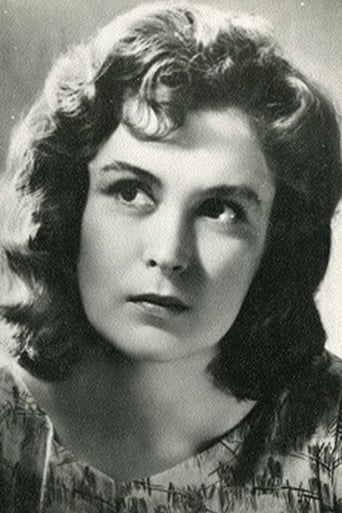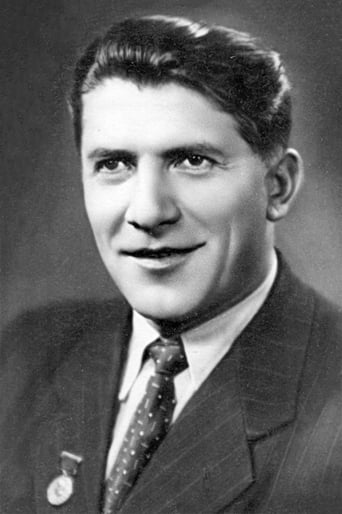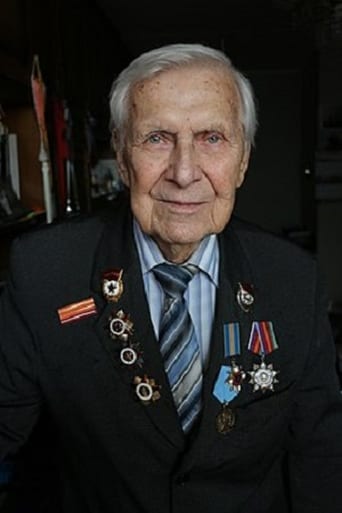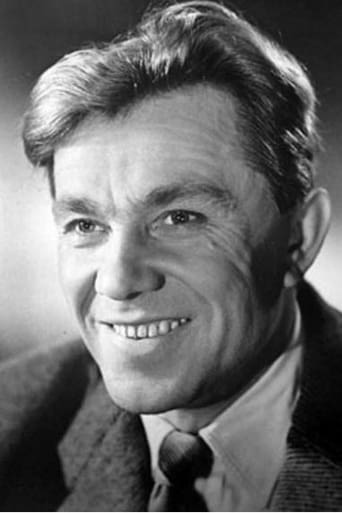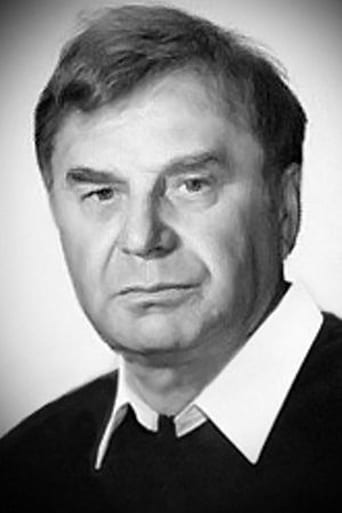UnowPriceless
hyped garbage
BelSports
This is a coming of age storyline that you've seen in one form or another for decades. It takes a truly unique voice to make yet another one worth watching.
Guillelmina
The film's masterful storytelling did its job. The message was clear. No need to overdo.
Becky Alfaro
The Forty First is a film about two star-crossed lovers who meet a tragic end as a consequence of the time period in which they belong. Set in the years during the Russian Civil War, the film follows Maryutka a red army soldier whose group captures Vadim, a cadet for the white army whom she eventually develops feelings for after connecting with him on a deeper level. The opening credit scenes with its roaring waters and its gloomy music catches the attention of the viewer immediately with its foreshadowing of the tempestuous times to come. The film is more adapted to what films are today so it is easy to become engrossed in it. There are very notable differences in the style of directing within this movie as opposed to the films that were produced during the Stalinist time period. For example, the characters all seem much more individualistic and express their opinions more openly. Of course considering the nature of the film, it being for propaganda purposes, there are still pro revolutionary ideals presented through the unwavering determination that Yevsyukov has to continue for the sake of the revolutionary cause and of course the ending scene in which Maryutka gives the ultimate proof of where her loyalties lie. There is a good use of the space around the characters which turns out to be a great cinematic tool. There are shots of both the arid dessert and the tempestuous sea. It manages to capture both its beauty, as Maryutka noted when comparing it the sea to Vadim's eyes, and its power of destruction when it killed two men and stranded them on the island. The whole storm scene was strategically captured through different angles and distances, further exemplifying the success of this story as a film. Despite the ending which was both astonishing and expected, this film was enjoyable to watch. With all of its elements it ends up being a haunting tale.
ironhorse_iv
A Soviet Love Story such as Forty First as is one of the best foreign movie, I ever saw. Produced in the Soviet Union, during the height of the Cold War, this film is one of the first significant films to be produced after the fall of Stalinism after de facto leader Joseph Stalin died a few years before this film came out. I was completely wowed by Director Grigoriy Chukhray's film who is most famous for his work on 1959 'Ballad of a soldier'. The film is based on the novel by Boris Lavrenyev and this film is also a remake of the 1927's Soviet silent film also call 'Forty-First' directed by Yakov Protazanov. The film is set during the Russian Civil War of 1919 to 1922 where Bolsheviks Red Army fought against the anti-Bolsheviks Russian Republic. It tells the story of a tragic romance between a female sniper of the Red Army name Maria Filatovna (Izolda Izvitskaya) and her captured prisoner, Vadim Nikolayevich Govorkha (Oleg Strizhenov) from the White Army. Maria is known as a very good markswoman who has already claimed thirty-eight enemy dead. When her unit ambushes a camel caravan transporting White soldiers, she kills two of them and tries to shoot their officer, who will be her forty-first, but misses. The man, a lieutenant named Govorukha. Instead of killing him, due to him stating out that he had secret information that would help her unit. Maria is entrusted with guarding him while shipping him out to their headquarters through the Aral Sea. The vessel capsized in a sudden storm, and only lead Maria and Govrukha alive, stranded on an isolated island. At first, tensions arise by their different attitudes of life, but slowly become charmed with each other to the point that they befriend each other with affection. For a war movie, there is very little violence in this as most of the movie is romantic. I love the Robinson Crusoe references in the movie. The ending is haunting and one of the best shocking endings I ever saw. It's a shame that this isn't generally available, and hard to find. It took me forever to find a copy. Even if you get a copy, you might not have sub-titles. Just to let you know when trying to translate from the Russians, some of the movies copies got their names wrong. In the original novel, the sniper name is Maryutka Filatovna, while the captured prisoner is Govoruha Jr. Depending of what version you able to get, you might get different names. The biggest confusing is the name of the Lt. that she captured alive. There are such names ranging from Govorukha-Otrok to Govorkha Aksenov. The movie has some really great shots that I love. Both in black and white or in color. If you see it in color, the cinematography by Sergei Urusevsky is just amazing with its use of composition and lighting. If you see it in black and white, you can truly love the dark tone and shadowy side of the film. I would say, watch both versions. I like how they shot the Karakum Desert, and this was pre-1962's Lawrence of Arabia no less. This film is beautiful to look at. But its overwrought emotions and simplified ideologies may put off many. There is a bit of Russian melodrama and pre communism propaganda that is a bit disturbing. The whites are made to look like bourgeoisie officers performing acts of unjustified brutality while the Reds as under-supplied and struggling in the face of insurmountable odds fighting for freedom. Still, the propaganda is not too bad that it's nearly unwatchable. The acting is a little too melodramatic to buy into either being real people and their ideological differences are rather crudely sketched. While Maria acts like a man most of the first part of the film, it's time she spent with Govorukha that turns her back into a woman, until the final moments of the film, where she realize she is a soldier first. It's a great character development. The music is stunning as the use of children's choir singing is tear breaking and sweeps through the entire film. Overall: watch the film, and see how Maria must choice between being in love with Govorukha and her duty for her country. Watch her, as she is drawn into a moral dilemma that leads to a heart-rending ending. It's a good shot, that you like this movie as well.
larma7
Quite a filmmaker this Chukhrai was. Not much available from him, but I am happy to have seen two of his movies. "The Forty-first" perhaps wasn't as great as the wonderful "Ballad of a Soldier", but this is still quite an interesting film. Both of these films are war films, but contrary to what one might expect these films are told in a rather romantic, light-hearted, Hollywood style. Both films do have tragic elements which present themselves as the films progress, but they are largely rather light and enjoyable, even charming romance pictures of loved ones being torn apart and doomed by war. This story was started here with "The Forty-first" and would be perfected in "Ballad of a Soldier".The script isn't particularly strong here, but where this film really stands out is in its visuals. An utterly stunning visual work from Chukhrai. I'm not sure I have seen a color film look like this one before! You have to see it to understand. Additionally, it's just constantly a visually dynamic film in Chukhrai's camera-movement and use of close-ups. The film is at the very least continually visually interesting and at its peak just stunning to look at. There's a really rich, dreamy atmosphere that develops by the end of the movie, and it makes for a quite unique viewing experience.The ending is both quite outlandish but also tragic. Not too sure what to completely make of it. Then again, this was never a film which really strived for any kind of realism, so its over the top nature isn't too jarring with the rest. Actually, the more I think about it, the more I like it.
Fpi
Much can be said about the range of emotions found in today's movies. They've certainly become better at promoting a cool atmosphere, adrenaline rushes, making plots that are cleverly built up to a climax, and fitting in as many square centimetres of skin as possible into the film. Some emotions are, however, totally, and I mean totally, disregarded. Intense melancholy, an intense sense of longing and sensations of intense pity for the characters are now nowhere to be found. This movie has all of that in spades, making it radically different from today's European and American movies. It is more "theatrical" than today's more "realistic" films, but for God's sake, don't let that put you off. An incessantly beautiful soundtrack sweeps through the entire film, and the pictures are stunningly beautiful, though in a Russian way that can simply be labelled "different". This film was an eye-opener to the fact that I've seen so many movies that ultimately have left me nearly indifferent to the fate of the characters, and to some loose theory that melancholy and pity are closely related. Everyone should hunt this movie down. The ending will haunt you forever. Anything you watch afterwards will seem like ridiculous attempts to give you cheap thrills.
